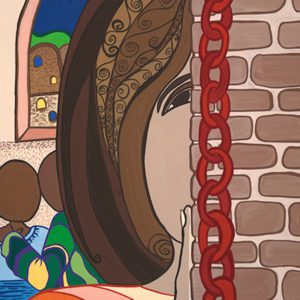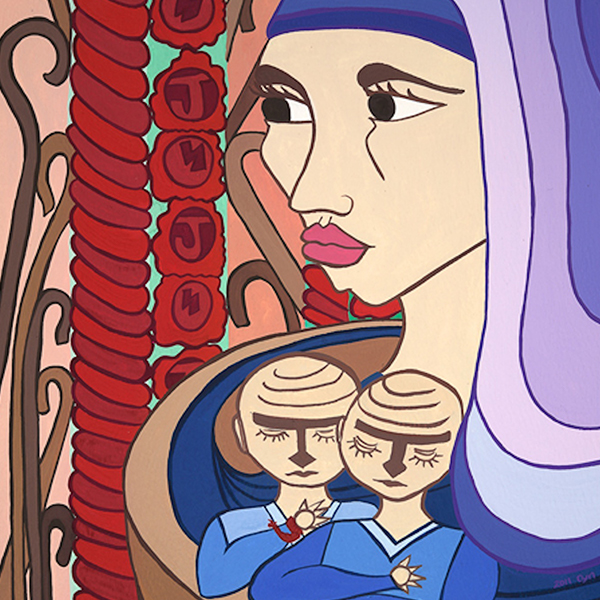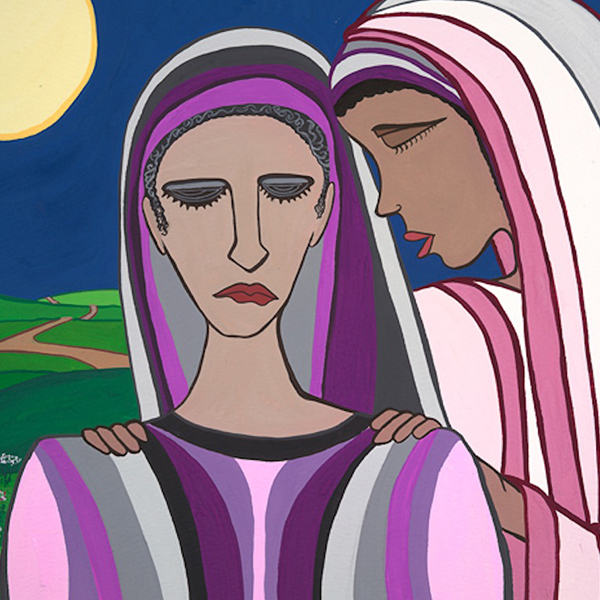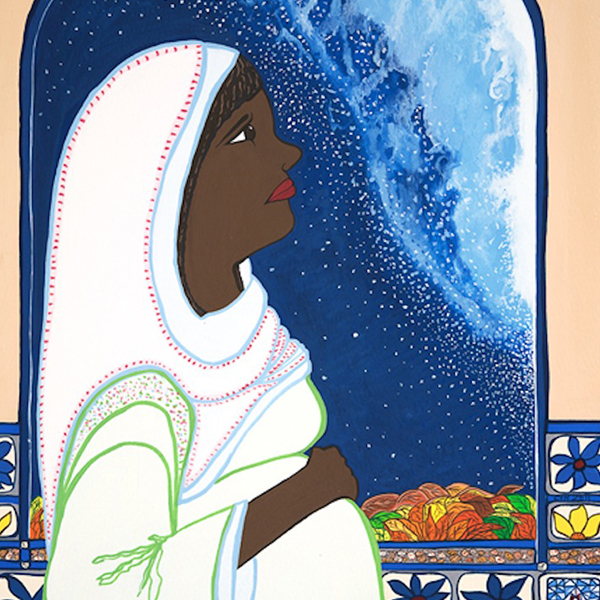From the Wall of Shame to the Hall of Fame

The first out-of-place-ornament on Jesus’ family tree, Tamar, the Canaanite, once played the part of a prostitute for one night. The second out-of-place-ornament, Rahab, WAS A PROSTITUTE.
Rahab’s story, connected with the broader account of Joshua’s conquest of Canaan and Jericho’s walled city, is recorded in Joshua 2:1-24, 6:1-27. James 2:25, Hebrews 11:31, and Matthew 1:5 also mention Rahab.
Outside of Matthew’s genealogy, she is always referred to as “Rahab, the prostitute.” But there is so much more to her story than her life as a prostitute. What Rahab does and why she does it both testify to the love of God and the power of his Word working faith and through faith.
Rahab goes from living in a wall of shame to being included in the Hebrew hall of fame. How does that happen?
The Heavy Burden of Guilt
Think about who Rahab was—a prostitute living an openly sinful life. She was not an upstanding moral citizen who had gone to Sabbath School every week with Israel’s children. She was a gentile, who had probably never learned the Ten Commandments or listened to a talk about repentance, but she would have known this, “I am not who I ought to be.”
Every night that she brought another stranger into her bed, guilt must have weighed her down even more heavily than the men. Every morning as she woke up to a cold empty bed and placed the money from the night’s deeds in their place of safekeeping, she must have felt repulsed by what she had done.
Selling her body to men who would never bring her the kind of safety and security she was looking for was only one sign of the sin that stained her heart and soul.
The remorse of Rahab’s sins, sexual and otherwise, certainly was on her mind as she looked across the Jordan River to the East and saw the hoard of Hebrew slaves, now a massive army of millions, on the attack. Sure, she was “safely” locked inside a fortress, but the soldiers on the other side of the river had obliterated the armies of Sihon and Og. She should have been, like the rest of the people in her city, trembling in fear, but as we learn, she wasn’t. Why?
It wasn’t because she was sitting there thinking, “I hope there is a way that I can please God and somehow save myself from the impending Day of Judgment on Jericho.” For her, her family, and the entire city, a day of judgment was coming. Death and destruction loomed on the horizon. Like every other human being that has deep inside of them a natural knowledge of right and wrong, she must have known that not only her prostitution but all her sins made her deserving of God’s wrath and condemnation.
Like the rest of that condemned city, Rahab must have wondered, “What’s going to happen when it’s all over?” Like the others were, facing the certainty of death at the hand of the Hebrews and their God, she should have been terrified. But again, she wasn’t. Why?
Unexpected Knocks at the Door
One evening, two men simultaneously showed up at her door. Probably unlike any men she had ever met before, they knocked on her door, not seeking sex but salvation. They desired not a few minutes of pleasure in her bed but a place to hide for their very lives. The enemy was no longer at the gates, but her very doorstep. She, the one who needed saving from the Hebrews and their God, now held two Hebrew lives in her hands. What would she do?
How would Rahab go from the wall of shame to the Hebrew hall of fame?
We don’t know what sort of a message or plea these two men shared with her, but we know what she did and said. Rahab told the two men what she knew about this God, who went before his people into battle. She knew that this God was so much more powerful than any of the gods the people worshiped in the Jordan River Valley. She knew that this was God of heaven and earth. She knew that this God could save these men and her.
Faith Expressing Itself In Deeds
Shortly after the first two, more men came knocking at her door. Jericho discovered that there are spies in her midst. The king sent soldiers to capture and then (probably) to torture and kill them. Rahab then did something unbelievable; she concocted a plan to save them. Not because she was a “good person” or thought she could barter with God and deserve some reward from him; instead, Rahab acted by faith.
The book of James and the book of Hebrews (while making sure we know that she was a prostitute) tell us that it is by faith that Rahab hid these men. In Hebrews 11:31, she’s highlighted alongside other heroes of the faith like Noah, Abraham, and Moses.
The Apostle James likewise uses Rahab as an illustration of the connection between faith and deeds (James 2:25). Rahab’s works of receiving the spies, protecting them, and hurrying them on their way showed that saving faith was alive in her heart and soul.
Her deeds didn’t save her; instead, they demonstrated that she was already saved. Rahab’s actions were a result of her righteousness, not the cause of it.
Rahab already had faith before the spies ever came to her. The Word about Israel and her God had come to Rahab before the spies ever came. And Rahab had believed that Word. What she did with the spies was a result of the faith that already existed in her heart. Rahab didn’t get a trophy of faith for what she did; she is a trophy of faith for God and what he has done. She is one in a long line of men and women through whom God worked by faith.
It was indeed an incredible and heroic thing Rahab did by faith. She deceived the soldiers and sent them on a three-day wild goose chase in the opposite direction. When it was safe for the spies to come down from the roof, she said to them, “When you come back to destroy this city, and I know your God will do this, remember me, remember my family and me, remember what I have done for you.” And the two men said to her, “Yes, we will remember you. As long as you keep your promise, we will keep our promise.”
A Scarlet Cord of Salvation
Then comes perhaps the most striking part of all. Rahab lowered the spies down from a window in the wall. And one of the men handed her a scarlet cord saying, “Hang this in your window. It will be a sign to us that this is Rahab’s house, the one who showed kindness to us. And your family, who finds refuge with you inside your home, will be saved as well. But anyone outside, their blood will be on them, not on us.” Rahab took that red cord and hung it in her window.
Imagine the emotions and thoughts that must have raced through Rahab’s heart and mind as she took that scarlet cord into her hands. “For me. For me. This is for me. This is my salvation. Not only does God not condemn me for my sins, but he adds grace upon grace. He is showing me mercy and not just for me. I get to go out and tell my whole family to come and find haven with me in him, the Lord of heaven and earth.”
Like the people of Israel in Egypt, a generation before whose doors were by faith marked in the red blood of the lamb, the wrath of God would pass over her house, by faith marked in the red cord of a spy. That scarlet cord was, for Rahab, a sure sign of salvation on Jericho’s judgement day.
When the Walls Come Tumbling Down
Israel soon surrounded the city and marched around it every day, for seven days. When the walls fell, Israel’s army took the city but spared Rahab and her family. And not only was Rahab protected during the battle, but she was accepted into the community of Israel. She eventually met a man who loved her for who she was rather than what she could do. In time, they married and had a child together. That child’s name was Boaz, who would later marry another foreign woman of faith—Ruth, the next out-of-place-ornament on Jesus' family tree. And through Ruth and Boaz, Rahab would become the great-grandmother of King David. Together they are all part of the line of the Savior Jesus. That’s how Rahab went from the wall of shame to the Hebrew hall of fame.
Two Canaanite women associated with prostitution included in Jesus’ family tree; What is Matthew telling us?
Jesus Friend Of Sinners and Our Scarlet Cord of Salvation
Matthew included Tamar and Rahab in his genealogy to let us know that Jesus had a background a lot like yours and and a lot like mine.
He who came from a long line of sinners, but was sinless himself, called himself “the friend of sinners.” Jesus once said he didn’t “come to call the righteous, but sinners to repentance” (Luke 5:52). He also said, “The Son of man has come to seek and to save that which is lost” (Luke 19:10). No matter what your past, Jesus can save you. You, too, have a scarlet cord, a lifeline for salvation on the great Judgment Day.
Over the years, Rahab’s scarlet cord has come to be a symbol of our salvation as well—a sign of the scarlet blood Jesus shed on the cross for you and me. What the scarlet cord in the window was to Rahab; the blood of Jesus is to us.
The scarlet blood of Jesus that hung from his side is sure salvation for you and me. Salvation for we who live in a world that is not going to have its judgment day brought about by Hebrew soldiers but by the Lord God himself. Salvation for we who maybe haven’t sold our bodies for sex, but whose lives are just as wrecked by sin, as we have given our minds, our tongues, and our hearts in adultery against our King and our God. And Jesus reaches down from the cross and says, “This is for you. This body. This blood. My scarlet will make your crimson stains white as snow.” (Cf Isaiah 1:18)
That’s the good news of the Gospel. No matter what you’ve done in the past, or who you are in the present, Jesus can save you. If a prostitute in the pagan nation of Canaan can be saved, you can be saved. No matter what your past looks like, or your present feels like, no matter where you’ve been or what you’ve done, those who place their faith in Jesus and his blood are protected and accepted into his family.
The fact is—Rahab’s story is our story too. Rahab had a promise from those men that they would come back on Jericho’s judgment day and bring about salvation. We have a similar promise from a Man that came into our world. On Judgement Day Jesus will be your salvation. One day, Jesus will come back to take you to be with him in the new and better Promised Land. But while you are here, go, go out into this world awaiting judgment and let everyone know about your scarlet cord of salvation found in Jesus. He is your protection and your acceptance.
Questions to Consider
- What does Rahab’s story lead me to confess about myself and my story?
- What does Rahab’s story teach me about Jesus and my part in his story?
- What does Rahab’s story and her place in his story lead me to pray about this week?
More Stories from Jesus' Family Tree
Are you anxious?
Free 4-Lesson Scripture Study
We are all carrying something. Weariness from the treadmill of life, isolation and loneliness from feeling like we don’t belong, anxiety over what might happen to us and those we love in the end, bitterness from failing to forgive, or tension from having forgiveness withheld from us.
Our FREE, Handbook for Healing scripture study identifies your pain, shares the cure and provides a treatment plan for living a life of freedom, forgiveness and peace can look like for you.




